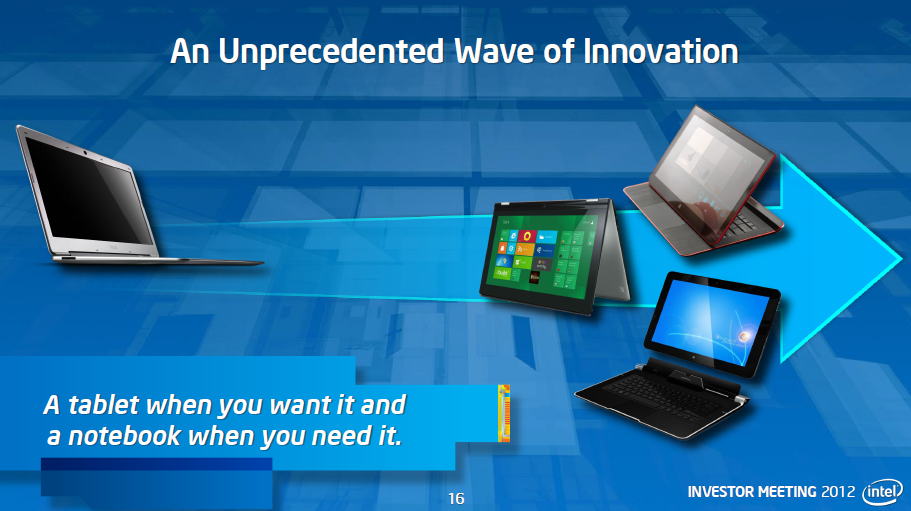Windows 8 tablet hybrids: 'Compromises of convergence'?

Windows 8 tablet/ultrabook hybrids will reportedly hit retail stores in November. Whether these devices sell will impact the consumer, SMB and corporate markets.
CNET's Brooke Crothers noted that Windows 8 tablets based on Intel chips (ARM too) will land in November. Certainly, chipmakers are upbeat about the Windows 8 prospects.
For instance, Intel's general manager of the PC client unit, Kirk Skaugen, spent a lot of time talking about ultrabooks, including convertible form factors, last week at the company’s investor meeting.
Skaugen's money slide is below.
Meanwhile, Nvidia executives were gaga for Windows 8 tablet/laptop hybrids too. Nvidia plans to roll with its Tegra 3 chip to power Windows 8 on ARM.
Related: Q&A: What BYOD means for IT | Can the enterprise popularize notebook, tablet touch hybrids? | Great Debate: Can the enterprise popularize tablet-laptop hybrids?
Nvidia CEO Jen-Hsun Huang said last week:
As Microsoft goes to market, people will understand why we're so enthusiastic about Windows on ARM. They're just very different things. I'll let Microsoft tell you about their plans, but I'm very enthusiastic about it. I think it makes a lot of sense for enterprise. Anybody who has a large part of their work around Windows would really benefit from Windows on ARM tablets.
The promise of these tablet/ultrabook hybrids is that you'll have touch and the functionality of a laptop. For someone like me these hybrids are appealing. But I may be a small market since most folks don't write as much and need a keyboard.
Why is the consumer retail launch so important to the hybrid market? In a word, it's all about consumerization. Should hybrids find their way under Christmas trees they have a realistic shot at succeeding in the enterprise.
However, should these hybrids flop corporations will stick to laptops, consumers won't bring hybrids to work and we'll still have a tablet vs. laptop world.
Microsoft and Intel will do everything they can to market these hybrids, tablets and ultrabooks. Intel is planning on spending more than it did to market the Centrino chip.
Apple CEO Tim Cook isn't convinced that combo tablet-laptop effort will fly. On Apple's recent earnings conference call, he said:
Anything can be forced to merge. But the problem is that the products are about tradeoffs. And you begin to make tradeoffs to the point where what you have left at the end of the day doesn't please anyone. And you can converge a toaster and a refrigerator, but those things are probably not going to be pleasing to the user. And so our view is that the tablet market is huge, and we've said that since day one.
Now, having said that, I also believe that there is a very good market for the MacBook Air. And we continue to innovate in that product, but I do think that it appeals to someone that has a little bit different requirements. And you wouldn't want to put these things together because you'll wind up compromising in both and not pleasing either user. Some people will prefer to own both. And that's great, too. But I think to make the compromises of convergence, we're not going to that party.
Microsoft has been to that party repeatedly. Laptop/tablet hybrids have been attempted before. The wild card for Microsoft will be whether this invite to the hybrid party gets customers to show up.
